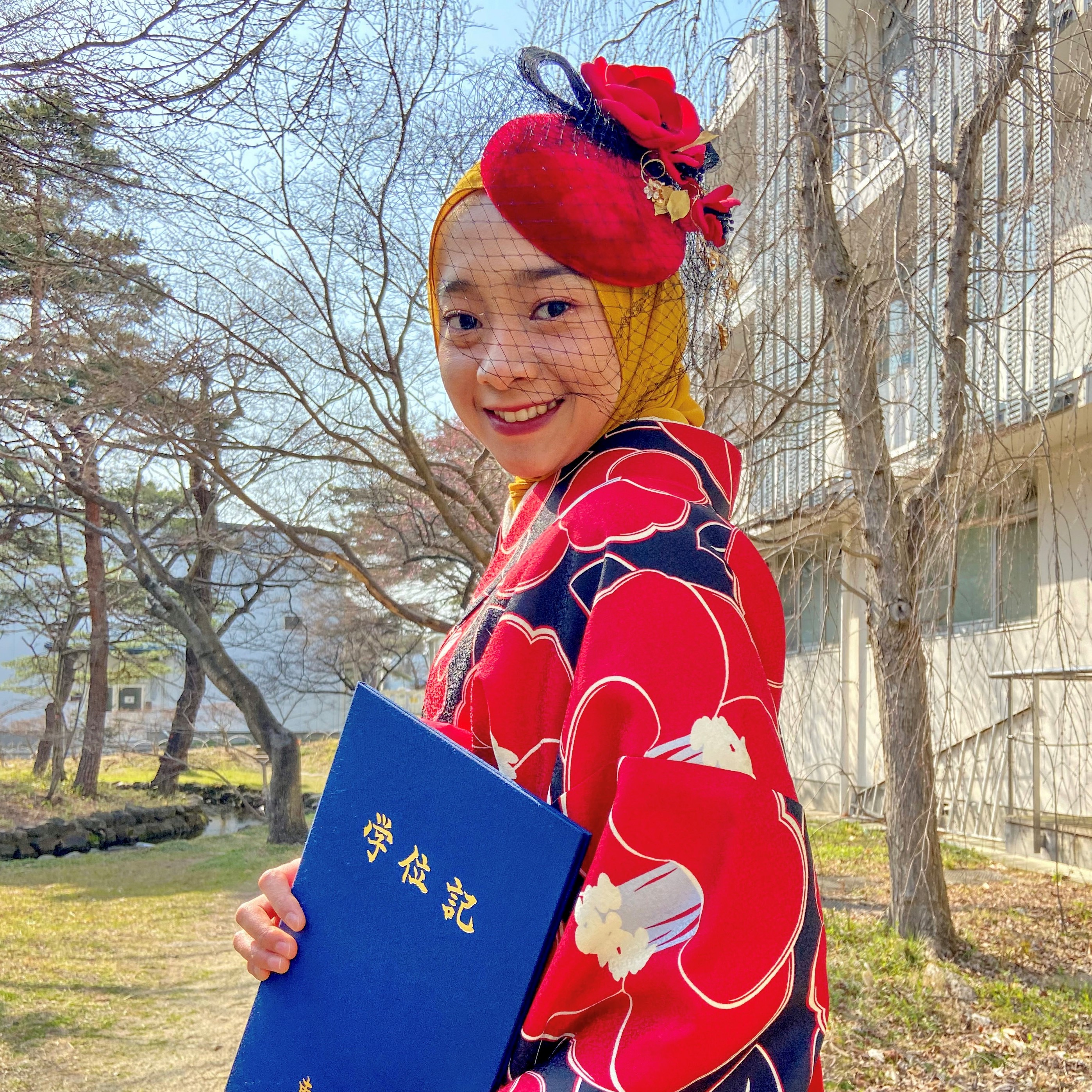大学院説明会
特設ウェブサイト
- トップ
- インタビュー
- Woro Mustika Weni
困難な課題が待ち受けていても
素直な心で、誠実に、忍耐強く、感謝して楽しみ
次のレベルにステップアップ
- 保健学専攻
- Health Sciences
- 老年・在宅看護学分野 在校生
- Gerontological and Home Healthcare Nursing
- Woro Mustika Weni
- ウォロ ムスティカ ウェニ
- 学年:博士後期過程2年
出身地:インドネシア - 2023.06.16

母国の介護現場により良い認知症ケアを取り入れるために
●大学院に進学しようと思った理由を教えてください
修士課程では、介護現場におけるケアスタッフによる認知症ケアにおけるパーソンセンタードの程度を測定する尺度「Person-Centered Care Assessment Tool(P-CAT)」のインドネシア語版を開発するための研究を行いました。インドネシア語版P-CATの信頼性・妥当性を検討し、その結果、インドネシアのケアスタッフは、認知症の利用者さんのニーズに柔軟に対応するのが難しいという興味深い知見が得られました。まず、日本の高齢者施設では仕事のルーチンは柔軟ですが、インドネシアの看護師には仕事のルーチンを利用者さんのニーズに合わせて調整する裁量権や力がない、ということが考えられます。また、インドネシアのケアスタッフの場合、ルーチンを変更すると、他の利用者さんの日常生活に悪影響を与えることがあります。スタッフ不足や、パーソン・センタード・ケアの実施を支援しない政策などの理由もあります。パーソン・センタード・ケアの本質は、認知症の方のニーズや希望をかなえることなので、これらの問題についてはさらに調査が必要であり、研究を続けていくことにしました。現在、老年・在宅看護学分野の博士課程2年生です。
In my master’s course, I conducted research to develop the Indonesian version of the questionnaire which measures the degree of person-centeredness in dementia care by care staff in long-term care settings, namely the Person-Centered Care Assessment Tool (P-CAT). As a result, we developed a valid and reliable Indonesian version of the P-CAT. On top of that, we found an interesting finding suggesting that Indonesian care staff has difficulties in flexibly adjusting their work routine to the needs of clients with dementia. What does this thing imply? Well, there are several possible arguments, first, the work routine in Japanese older people facilities is changeable, but Indonesian nurses do not have the authority or power to adjust those work routines to match clients` needs. Secondly, the work routine is strict, even though they have the authority, changing the routine will have an adverse effect on other clients’ daily routines. Or other reasons such as a shortage of staff and policies that do not support the implementation of person-centered care. As the heart of person-centered care is to fulfill the needs and wishes of persons with dementia, these issues require further investigation, hence I decided to continue my study. I am currently a second-year Ph.D. student in the Gerontological and Home Healthcare Nursing Department.
●進学してみて、どうでしたか?
博士後期過程に進学することは、ゲームで次のレベルにステップアップするような気分です。不安と興奮、そして未熟さを感じています。より高度な知識、技術、レジリエンス、知恵、価値、美徳を必要とする、より困難な挑戦が待ち受けていると思います。しかし、全知全能の神様が私に与えてくださった全ての山や谷を、素直な心で、誠実に、忍耐強く、そして感謝して楽しんでいきたいです。
Continuing my study for a doctoral degree feels like stepping up to the next level in the game. I feel anxious, yet excited, and unready. I believe there will be harder challenges, that require me to possess a higher level of knowledge, skills, resilience, wisdom, value, and virtue. Nevertheless, I will enjoy every peak and valley that God the Almighty has bestowed upon me, with an open heart, sincerity, patience, and gratitude.
相手の立場になってニーズを理解し、敬意を持ってケアを
●研究テーマとそれを選んだ理由を教えてください
私の研究テーマは「認知症の人へのパーソン・センタード・ケア」です。この概念は、認知症の人の心理的ニーズを認識することに重点を置いています。基本的には、愛という主要なニーズを中心とし、くつろぎ・安らぎ、愛着・結び付き、自分が自分であること、携わること、共にあること、という5つのニーズがあります。それらのニーズが満たされないと、「チャレンジング行動」「行動問題」と呼ばれる望ましくない行動に表れてしまいます。これを医療用語では「認知症の行動・心理症状(BPSD)」と言いますが、こうした行動が認知症の方に良くないレッテルを貼り、イメージを悪くしてしまっています。そうならないために話を聞き、ニーズを認識し、敬意を持って接し、相手の現実、ユニークさ、背景、人柄などを受け入れ、つながることを通して、相手の人柄や幸福を維持できるとされています。
介護の現場で問題なのは、ケアスタッフがこの概念の意味を真に理解していないことです。看護師が笑顔で自己紹介をし、何か手助けをすると、ほとんどの場合、協力的な反応が示されると思います。しかし、認知症の方は着替えを手伝ってくれる看護師を見ず知らずの人と思い、心の中では「あなたを知らない」「自分でできるから手伝いはいらない」「プライバシーが欲しい」と思っている可能性があります。記憶力に問題があるため看護師として認識しておらず、自分の状態も把握できていないため助けを拒み、脅威を感じる場合もあります。このような状況は認知症ケアの現場では日常茶飯事ですが、経験、知識やスキルが不足しているケアスタッフは、無意識に相手を卑下するような対応をしてしまう危険性があり、相手のPersonhoodを傷付けてしまいます。だからこそ、相手の話を聞き、相手のニーズを認識し、敬意を持って接し、相手の現実や人柄などを受け入れ、相手とつながることが極めて重要になるのです。
私たちがどのように接したかが、鏡のように、認知症の方の反応や行動に表れ、ケアスタッフが一人一人のニーズを満たしているかどうかがわかります。ですから、認知症の方のケアには、純粋な誠意、忍耐力、芸術性、創造性が必要なのです。そのため、私は認知症ケアの分野を研究テーマとして選びました。また、認知症ケアにおける「パーソン・センタード・ケア」の重要性を広く伝えていく責任も感じています。特にインドネシアでは、認知症ケアに関する国民の意識はまだ低く、インドネシアの看護師にとっても、カリキュラムで十分にカバーできているとは言えません。ですから、私はこの分野の研究を続け、人々の意識を少しずつ改善し、ケアスタッフにとっても、認知症の方にとっても優しい環境をつくるための看護教育を行っていきたいと考えています。
My research topic is “Person-centered care for persons with dementia”, this concept emphasizes recognizing their psychological needs. Basically, there are five needs that combine into the need for LOVE, namely COMFORT, ATTACHMENT, IDENTITY, OCCUPATION, and INCLUSION. When those needs are not met, they are expressed in undesirable behaviors which unfortunately people often called it “challenging behaviors” or “behavioral problems”.In medical terminology, this is called “Behavioral and Psychological Symptoms of Dementia (BPSD)”. These behaviors have given people with dementia a bad label and tarnished their image.Through listening, recognizing his needs, treating him with respect, accepting their reality, uniqueness, background, personhood, etc., and connecting with them, it is said that we can maintain their personhood and well-being.
The problem in care settings, care staff do not truly understand what this concept means. For cognitively intact patients, when nurses came, smile, introduce themselves, and offer some helps, they would mostly respond cooperatively. But persons with dementia view reality differently. Let us suppose you see a client with dementia who is having a hard time putting her cloth on. You do the same as the aforementioned, but her response is she refuses your assistance. But trying to look at the situation from their glasses, in her perspective, she thinks of you as a perfect stranger who comes to her offering help to get dressed, in her mind, she will think “I don`t know you”, “No I don`t need help cause I can do it myself”, and “I need some privacy here”.
Let me break down her response, because of her memory problem she does not remember you as a nurse. She also feels she is capable of doing it herself because they do not remember her condition, so she refused your help. Since she saw a stranger intruding into her room while getting dressed, insisting to help, she feels threatened and recognized you as a “bad” person. These situations happen every day in dementia care settings, however, care workers with a lack of experience, knowledge, and skills will unconsciously respond with demeaning behavior, which hurt their personhood. This is why, listening to them, recognizing their needs, treating them with respect, accepting their reality, personhood, etc., and connecting with them becomes extremely pertinent.
Just like a mirror, how we treat them is manifested through their response, it will tell us whether the care staff meets their needs. Therefore, in caring for persons with dementia pure sincerity, perseverance, art, and creativity are necessary. For this reason, I am fascinated by dementia care and chose this area as a research topic. Furthermore, I feel responsible for spreading awareness about the importance of “Person-centered Care” in caring for persons with dementia. Public awareness about these matters is still low, especially in Indonesia, and for Indonesian nurses, the curriculum has not yet covered these issues well. Therefore, I wish to continue my research in this field, and gradually improve people’s awareness, and nursing education to create a friendly environment for them.
研究者、教育者として、社会に貢献することで恩返しを
●今後の目標や抱負を教えてください
これからも研究者としての道を突き進み、教育者としての新たな冒険にも挑戦していきたいと思います。そして、これまで社会が私に与えてくれたものに恩返しする形で、社会に貢献したいと考えています。
I will keep on pursuing the path of being a researcher in the future and challenge myself for another adventure as an educator. As well as contributing to societies for what the societies have given me so far.
●日本の、東北大を選んだ理由を教えてください
東北大学が質の高い研究者やリーダーになるための知識、技術、その他の資質を培うことができる場所だと思って選びました。修士課程に入学して2年、今はそれを確信しています。加熱、冷却、再加熱、研磨、切断、研ぎ出しの過程を経て刃物が作られるように、東北大学は強く鋭い資質を持った研究者を育成しています。
After 2 years of taking my Master`s degree, I am convinced that Tohoku University is the place where individuals are able to cultivate the knowledge, skills and other qualities to be a high-quality researcher and leader. Just like the making of blades, through the process of heating, cooling, reheating, grinding, cutting, and sharpening, Tohoku University through challenging processes, produces researchers with strong and sharp qualities.
最近、母国インドネシアに帰って、飼い猫の「テモン」と一緒に過ごしました。この名前は、なぜかインドネシアの有名なコメディアンにちなんで、父が名付けました。ミカン色でトラのような模様があり、とてもかわいいです。とても活発で、目立ちたがり屋で、私がZoomミーティングや仕事をしている時、ノートパソコンの上に立ったり座ったりします。日本に戻ってきて、もうテモンちゃんに会いたくなっていて、また会うのが楽しみです。テモンちゃん、元気で、いい子でいてね。
Recently, I returned to my home country Indonesia. I have a cat called “Temon” he was named after a famous Indonesian comedian by my father for whatever reason. He is super cute; he has tangerine color with a tiger-like pattern. He likes to cuddle and is very active. He is also an attention seeker; he likes to stand or sit on my laptop when I am in Zoom meetings or just doing my work. I miss him already and cannot wait to see him again. Stay healthy Temon, be a good boy.

- PROFILE
- 保健学専攻
- Health Sciences
- 老年・在宅看護学分野 在校生
- Gerontological and Home Healthcare Nursing
- Woro Mustika Weni
- ウォロ ムスティカ ウェニ
2015年、インドネシアのアイルランガ大学看護学部を卒業。2020年まで日本・インドネシア経済連携協定介護福祉士候補生として愛知の介護医療院で働くことを決め、日本の介護福祉士資格を取得。認知症の方をケアする中で困難や問題に直面し、認知症ケアに関する疑問を解消し視野を広げるために、東北大学大学院医学系研究科老年・在宅看護学分野に進学。
I graduated from Airlangga University, Faculty of Nursing, Indonesia in 2015, and decided to work at Long-term Care Hospital in Aichi under Economic Partnership Agreement Care Worker Candidate Indonesia-Japan until 2020 and obtained a Japanese qualification as a Care-worker. I faced enormous difficulties and issues while caring for people with dementia, to answer my questions and broaden my horizons related to dementia care, I decided to continue my study at Tohoku University, Gerontological, and Home Healthcare Nursing Department.